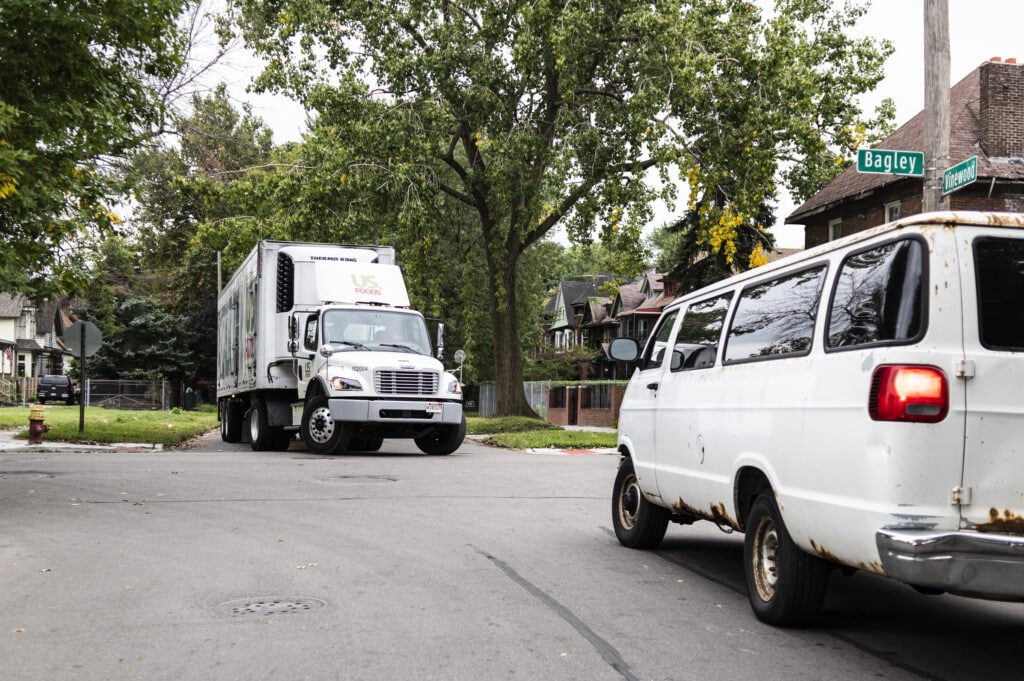Overview:
- Detroit officials are advancing a long-awaited truck route ordinance to keep freight trucks off residential streets in Southwest Detroit.
- Plans include enforcement, education, and infrastructure changes.
- The ordinance aims to legally establish truck routes and deter trucks from using restricted routes through signage, policing, and infrastructure changes.
- Residents are advocating for stronger enforcement and accountability, citing health concerns from diesel truck emissions.
Detroit officials are moving forward with a long-awaited truck route ordinance to keep freight trucks off residential streets across the city, aiming to enact the ordinance this summer.
At a recent District 6 City Council meeting, Augusta Gudeman, a freight specialist with Detroit Public Works, outlined plans for enforcement, education, and infrastructure changes. She said residents will have opportunities to provide input on enforcement strategies through public meetings and forums in the coming months.
“That will be incredibly important, taking us from something being on paper in the law to having an impact on the streets, improving residents and neighborhoods quality of life,” Gudeman said at the meeting.
District 6 Detroit City Councilmember Gabriela Santiago-Romero emphasized that the ordinance has not yet been formally introduced. She urges the community to push for its passage.
“This has to be a united front,” she said. “The community will need to organize and demand that we establish a truck route ordinance. We’re looking at strategies to make it harder for trucks to be on local roads, making these streets safer for pedestrians.”
How a truck route ordinance could be implemented
The plan’s first step is passing the ordinance to establish truck routes legally. But Gudeman acknowledged that legal measures alone will not change truck traffic patterns.
“Just because the law is on the books doesn’t mean trucks will automatically follow the rules,” she said. “Enforcement and education are critical.”
Once the ordinance is enacted, signage could go up within weeks. Long-term measures may include assigning police personnel to issue fines for violations.
To deter trucks from using restricted routes, the city is considering infrastructure changes such as redesigned intersections, speed humps and curb bump-outs, Gudeman said. Officials are also looking at optimizing traffic signals to make designated truck routes more efficient.
Additional long-term measures under review include adjusting street sweeping schedules to align with truck routes, addressing truck parking and idling issues and revising land use and zoning regulations for future developments, she said.
Public awareness efforts will target residents, business owners, and truck drivers to ensure they understand the new regulations. Gudeman also said enforcement will require staffing and resources, which could affect the timeline.
“We want to have a clear discussion of the feasibility of each of these strategies because, obviously, we are resource-constrained in the city,” Gudeman said.
She noted that community involvement will be key to enforcement, as residents will be encouraged to report violations to help ensure compliance with the ordinance.
Gudeman said the implementation plan aims to establish a clear sequence of steps, outlining responsibilities for both the city and residents. She added that the plan is intended to improve transparency and set clear expectations for the timeline.
learn more
Southwest Detroiters want a truck route ordinance now; city officials tell them to wait on ‘another study’
Residents say the clock is ticking to make changes to zoning rules or pass a truck route ordinance.
Weary of waiting for a truck route ordinance, Southwest Detroit residents ask city officials to enforce existing traffic laws
Cynthia Mendez is tired of living with the noise, the vibrations and the soot from constant truck traffic coming past her home on Livernois in Southwest Detroit. The rumbling wakes her up at night, the vibrations have caused damage to the foundation of her home, and the soot cakes up on her vehicle and the…
$3.2M federal grant aids Southwest Detroit nonprofit in replacing diesel trucks with cleaner options
Southwest Detroit Environmental Vision received a $3.2 million federal grant to replace 57 diesel trucks and a tugboat with cleaner options, cutting diesel emissions and enhancing air quality in the community.
Residents push for accountability
Southwest Detroit residents have long raised concerns about truck traffic and its health impacts. Keith Rodgerson, an artist and urban planner who developed asthma after moving to the area, said he and his neighbors are pushing for stronger enforcement. Asthma is associated with diesel truck emissions.
He also noted skepticism about the city’s commitment.
“The police department and the mayor’s office need to do their part,” Rodgerson said. “Right now, there’s a trust gap.”
He described frequent traffic issues caused by trucks getting stuck under low overpasses, particularly on West Grand Boulevard, sometimes idling for hours while waiting for tire deflation to clear the passage.
“When you’re walking with your children through backed-up traffic, breathing in diesel exhaust, it’s a real problem,” he said.
He added that slow-moving trucks on busy corridors like Vernor Highway worsen air pollution, exposing pedestrians to exhaust fumes.
“You have to walk through clouds of exhaust on the sidewalk,” Rodgerson said. “You see people with strollers pushing through all of it.”




